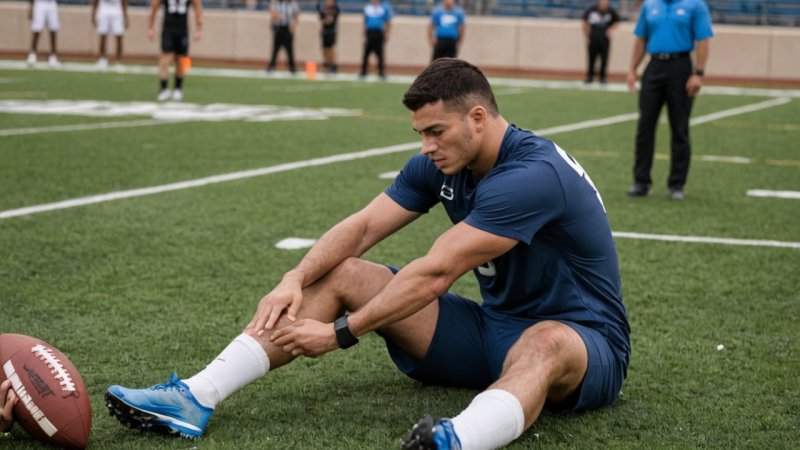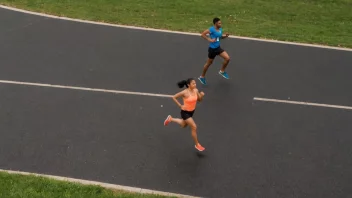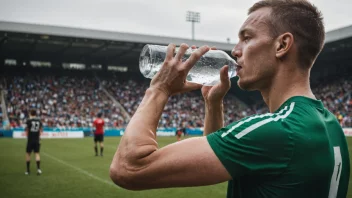In the world of competitive sports, particularly in football and rugby, the focus is often placed on performance during games or matches. However, an integral part of an athlete's journey lies in the recovery process that follows intense physical exertion. Post-game recovery strategies are essential for maintaining peak performance levels, preventing injuries, and ensuring long-term athletic health. This article delves into the various aspects of post-game recovery, exploring its significance and offering insights into effective strategies that athletes can employ to enhance their recovery process.
Understanding the Recovery Process
Recovery is not merely about resting; it involves a series of physiological processes that help the body repair and rejuvenate itself after strenuous activities. During a game, athletes experience physical stress that leads to muscle fatigue, microtears in muscle fibers, and depletion of energy stores. The recovery process addresses these issues by promoting muscle repair, replenishing energy sources, and restoring overall body function.
Why Recovery Matters
Effective recovery strategies are crucial for several reasons:
- Injury Prevention: Proper recovery protocols can help mitigate the risk of injuries caused by overuse or fatigue.
- Performance Enhancement: By allowing the body to rest and recover, athletes can train harder and perform better in subsequent games.
- Mental Health: Recovery time also provides athletes with the mental respite needed to maintain motivation and focus.
- Longevity in Sport: Regular recovery practices can extend an athlete's career by reducing the wear and tear on the body.
Key Components of Post-Game Recovery
Post-game recovery can be broken down into several key components, each playing a vital role in the overall recovery strategy.
1. Hydration
Replenishing fluids lost during the game is one of the first steps in recovery. Dehydration can lead to decreased performance and prolonged recovery time. Athletes should aim to drink water or electrolyte-rich drinks immediately after the match.
2. Nutrition
Fueling the body with the right nutrients post-game is crucial. Consuming a balanced meal that includes carbohydrates, protein, and healthy fats will aid in muscle repair and replenish glycogen stores. Some recommended foods include:
- Lean meats or plant-based proteins
- Whole grains such as brown rice or quinoa
- Fruits and vegetables for vitamins and minerals
- Nuts and seeds for healthy fats
3. Active Recovery
Engaging in low-intensity activities such as walking, cycling, or light stretching can enhance blood circulation and help remove metabolic waste products from the muscles. This active recovery approach keeps the body moving without adding additional strain.
4. Rest and Sleep
Quality sleep is one of the most effective recovery tools available to athletes. Sleep supports muscle repair and recovery, cognitive function, and overall health. Athletes should aim for 7-9 hours of quality sleep each night, especially after intense competition.
5. Stretching and Flexibility Exercises
Incorporating stretching into the post-game routine can help relieve muscle tension and improve flexibility. Dynamic stretching before games followed by static stretching afterward can contribute to better recovery.
6. Cold Therapy
Cold therapy, or ice baths, is often used to reduce muscle soreness and inflammation. This practice involves immersing the body in cold water for a short period after intense physical exertion. The cold constricts blood vessels, reducing swelling and tissue breakdown.
7. Compression Gear
Wearing compression garments post-game can aid in recovery by improving blood flow and reducing muscle soreness. Many athletes find relief from using compression socks or sleeves after playing.
Modern Advances in Recovery Technology
As the landscape of sports continues to evolve, so too does the technology available to aid in recovery. The advent of modern technologies has provided athletes with innovative tools to enhance their recovery process.
1. Recovery Apps
Various apps are designed to track recovery metrics, including sleep quality, hydration levels, and nutritional intake. These apps can help athletes monitor their recovery and make informed adjustments to their routines.
2. Wearable Technology
Wearable devices such as heart rate monitors and fitness trackers allow athletes to monitor their physiological responses during and after games. This data can inform recovery strategies and training regimens.
3. Electrical Stimulation Devices
Devices that use electrical stimulation can aid in muscle recovery by promoting blood flow and reducing soreness. These devices can be used post-game to optimize recovery times.
Psychological Aspects of Recovery
Recovery is not solely a physical process; it also encompasses psychological elements. Athletes need to focus on mental recovery to complement their physical strategies.
Mental Rest
Post-game, athletes should engage in activities that promote mental relaxation, such as meditation, deep breathing exercises, or even pursuing hobbies. Reducing mental fatigue can enhance overall recovery.
Mindfulness and Visualization
Practicing mindfulness and visualization techniques can help athletes reset their minds and prepare for future challenges. Visualization can reinforce positive outcomes and boost confidence.
Creating a Personalized Recovery Plan
Developing a tailored recovery plan is essential for athletes. Each athlete's body responds differently to physical exertion, and recovery strategies should reflect individual needs and preferences.
1. Assessing Individual Needs
Athletes should consider their physical condition, sport-specific demands, and personal preferences when creating a recovery plan. Some may require more emphasis on nutrition, while others may benefit from more active recovery strategies.
2. Regularly Reviewing and Adjusting the Plan
Recovery plans should be dynamic, allowing for adjustments based on performance feedback, physical condition, and any emerging recovery technologies. Regular assessments will ensure that the plan remains effective.
Conclusion
Post-game recovery strategies are an essential aspect of athletic performance, particularly in physically demanding sports like football and rugby. By prioritizing hydration, nutrition, active recovery, rest, and leveraging modern technology, athletes can significantly enhance their recovery process. Furthermore, by addressing the psychological aspects of recovery, athletes can ensure they return to the field mentally refreshed and ready to perform. The journey of an athlete goes beyond the game; it includes the commitment to smart recovery practices that foster longevity and peak performance.






